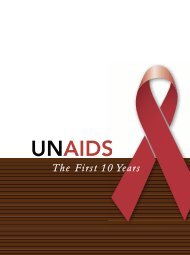Integration of HIV/AIDS activities with food and nutrition support in ...
Integration of HIV/AIDS activities with food and nutrition support in ...
Integration of HIV/AIDS activities with food and nutrition support in ...
You also want an ePaper? Increase the reach of your titles
YUMPU automatically turns print PDFs into web optimized ePapers that Google loves.
Integrated Programme Strategy 7:<br />
Support for <strong>HIV</strong>/AIDs-affected families <strong>and</strong> children<br />
through a school feed<strong>in</strong>g programme<br />
Families struggl<strong>in</strong>g to cope <strong>with</strong> chronic illness may decide to <strong>with</strong>draw children<br />
from school to earn money, help <strong>in</strong> <strong>food</strong> production, or assist <strong>in</strong> caretak<strong>in</strong>g.<br />
When a needs assessment suggests that school attendance may have been adversely<br />
affected by <strong>food</strong> <strong>in</strong>security <strong>and</strong> the effects <strong>of</strong> <strong>HIV</strong>/<strong>AIDS</strong> <strong>in</strong> a refugee community,<br />
a school feed<strong>in</strong>g programme should be considered. If <strong>food</strong> is provided at the school site,<br />
it should be given to all children to avoid stigmatization <strong>of</strong> those from<br />
affected households. <strong>HIV</strong>/<strong>AIDS</strong> sensitization <strong>and</strong> prevention <strong>activities</strong> should be<br />
<strong>in</strong>tegrated <strong>in</strong>to the school feed<strong>in</strong>g programme as well (Strategy 4).<br />
What does this <strong>in</strong>tegrated programme strategy aim to achieve?<br />
Children’s ability to attend school throughout the year is important for their cognitive,<br />
social <strong>and</strong> emotional development, <strong>and</strong> should be protected <strong>in</strong> <strong>HIV</strong>/<strong>AIDS</strong>-affected populations.<br />
Girls may be particularly likely to be <strong>with</strong>drawn from school to take care <strong>of</strong> ill family<br />
members. School attendance is vital for the development <strong>of</strong> life skills, <strong>in</strong>clud<strong>in</strong>g <strong>HIV</strong>/<strong>AIDS</strong><br />
prevention, <strong>and</strong> may reduce engagement <strong>in</strong> unprotected sex. School feed<strong>in</strong>g should not be the<br />
only response to evidence that <strong>HIV</strong>/<strong>AIDS</strong> <strong>in</strong> a household is associated <strong>with</strong> reduced school<br />
attendance; it should rather complement appropriately designed <strong>and</strong> targeted <strong>food</strong> security<br />
<strong>in</strong>terventions that enable affected families to send children to school.<br />
How would this <strong>in</strong>tegrated programme strategy be implemented?<br />
Institutional collaboration <strong>and</strong> coord<strong>in</strong>ation. Educational facilities collect data on annual<br />
<strong>and</strong> seasonal trends <strong>in</strong> school enrolment <strong>and</strong> attendance. Community health workers <strong>and</strong><br />
other cooperat<strong>in</strong>g partner agency health staff work<strong>in</strong>g directly <strong>with</strong> <strong>HIV</strong>/<strong>AIDS</strong>-affected<br />
households can monitor changes <strong>in</strong> school attendance among these households. Where either<br />
source <strong>of</strong> data <strong>in</strong>dicates significant reductions <strong>in</strong> attendance as a result <strong>of</strong> chronic illness, <strong>and</strong><br />
where a feed<strong>in</strong>g programme is determ<strong>in</strong>ed to be a suitable response, staff can collaborate to<br />
put a school feed<strong>in</strong>g programme <strong>in</strong> place, <strong>with</strong> mechanisms to monitor attendance <strong>and</strong> assess<br />
programme impact.<br />
Emphasis on participatory <strong>and</strong> community-led approaches. Before a school feed<strong>in</strong>g<br />
programme is implemented, participatory research should be conducted <strong>with</strong> communities to<br />
determ<strong>in</strong>e if <strong>food</strong> is the right response to the problem. School feed<strong>in</strong>g may help families to keep<br />
their children <strong>in</strong> school, but it does not address the issue <strong>of</strong> the caretak<strong>in</strong>g burden or hunger<br />
<strong>in</strong> the household. Participatory research can also help to identify opportunities to assist <strong>AIDS</strong>affected<br />
households <strong>in</strong> the care <strong>and</strong> <strong>nutrition</strong> <strong>of</strong> ill family members.<br />
Logistics <strong>of</strong> implementation. School feed<strong>in</strong>g programmes are likely to be <strong>in</strong>appropriate where<br />
school attendance rates are high, unless <strong>nutrition</strong>al surveys <strong>in</strong>dicate a high prevalence <strong>of</strong> mal<strong>nutrition</strong><br />
among school-age children. Reasons for decl<strong>in</strong><strong>in</strong>g school attendance, disaggregated<br />
by sex <strong>and</strong> age, should be identified. Where resources allow, follow-up may be conducted for<br />
children who do not attend school to determ<strong>in</strong>e the causes.<br />
59

















